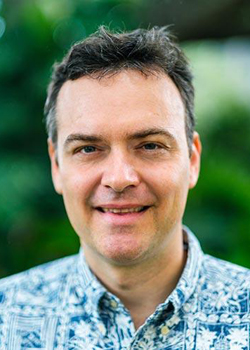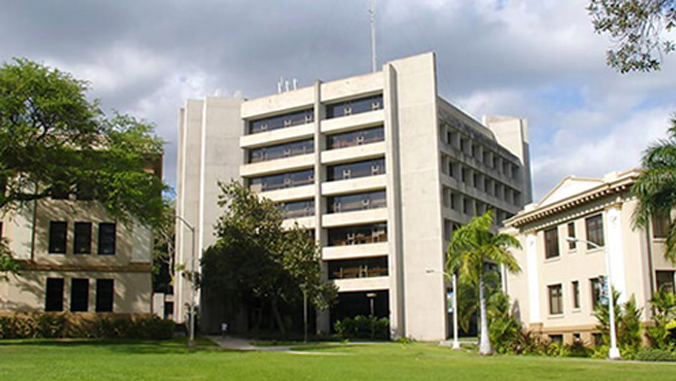
University of Hawaiʻi at Mānoa College of Social Sciences (CSS) alumnus and affiliate faculty member Micah R. Fisher was selected as the lone U.S. nominee for the APEC Science Prize for Innovation, Research and Education (ASPIRE) in 2022, and was one of 13 finalists for the international ASPIRE science award, which recognizes research that helps society achieve economic, environmental and social goals. As part of the recognition, Fisher’s work was showcased alongside two U.S. finalists in a public forum in January.
The ASPIRE competition promotes scientific excellence and international collaboration among young researchers ages 40 and younger. Each APEC (Asia-Pacific Economic Cooperation) member economy nominated one individual who was judged on scholarly publications, contributions to the theme, and level of commitment to cooperate and collaborate with peers from other APEC economies.
“I was so honored to be the U.S. nominee for ASPIRE because it is reflective of a series of intensive and growing collaborations across Southeast Asia,” said Fisher, who taught the geography of conservation class in the Department of Geography and Environment and is leading a planning course in collaboration between sectors in the Department of Urban and Regional Planning this semester. “This award is really representative of how hard we’ve worked to establish a network of up-and-coming researchers across the region, providing support to strategically build capacity for research with diverse communities on environmental change.”
Fisher added, “Along the way, we have collectively learned so much about deforestation, land-use change, livelihoods, migration and some of the most pressing issues of our time. What I’ve always set out to do through my research initiatives and classroom learning approaches is to provide a platform for spotlighting multiple perspectives—especially local ones—on the complexities of environmental change.”
Showcasing research
The 2022 ASPIRE theme called for groundbreaking, original research focusing on “innovation to achieve economic, environmental, and social goals” on topics including biological advancement, sustainability and agricultural systems.
A January 10 public forum—featuring the research work of Fisher, and the two U.S. runners-up from Stanford University and the University of California, San Diego—was titled, “Innovating Community, Institutional, and Generational Partnerships on Environment Challenges.” Fisher’s presentation focused on facilitating new ways to produce knowledge across different worldviews as a foundation for solving complex environmental challenges. Drawing from his experiences in understanding deforestation in Indonesia and advocating for community land rights, he described pathways that research networks can play in promoting environmental solutions. His APEC research partners are located in China, Thailand, Cambodia, Vietnam and Indonesia.
Wealth of experience, knowledge
We are so proud of Dr. Fisher, because this designation identifies him as the best young scientist to represent the nation on the APEC stage.
—Professor Krisna Suryanata
Fisher earned his MA from the UH Mānoa Department of Urban and Regional Planning and PhD from the Department of Geography and Environment. In addition to his current position as a research fellow at the East-West Center, the CSS affiliate graduate faculty has also worked as a professional planner and consultant, specializing in water resources, disaster management, and climate change adaptation initiatives with the World Bank, Mercy Corps and various organizations.
“We are so proud of Dr. Fisher, because this designation identifies him as the best young scientist to represent the nation on the APEC stage,” said Krisna Suryanata, professor and graduate chair in the Department of Geography and Environment. “His work in the research-policy nexus on environmental governance in rural and frontier areas highlights policy dilemmas and opportunities in climate change initiatives. His commitment to research-driven partnerships promote parity in studying environmental change and raise stakeholder perspectives and deepen regional networks.”
Two of Fisher’s geography and environment graduate students were enthusiastic in their evaluations about their instructor.
Working with Dr. Fisher has had a profound impact on my trajectory as a writer, thinker and researcher.
— Carter Beale, master’s student
“I took Dr. Fisher’s Geography of Conservation seminar in fall 2022. The course engaged students on complex environmental issues in Southeast Asia,” said PhD student Olivia Meyer. “My favorite part of the course was how he connected our readings to real-world issues by organizing field visits, such as a bio-cultural restoration site in Waimea Valley, and inviting local practitioners and scholars to speak to our class…His passion for research material, encouragement to pursue community-engaged research, and belief in our potential as graduate students to make a difference through our research made the class one of the most exceptional courses I have taken in my graduate career.”
Added master’s student Carter Beale, “Working with Dr. Fisher has had a profound impact on my trajectory as a writer, thinker and researcher. As an educator, he stands out for his generosity of attention, his careful and insightful feedback, and his infectious enthusiasm for deeply engaged scholarship…It is refreshing and enlivening to be in a classroom where the fire for such intellectual engagement still shines with vitality and sincerity, qualities that I am sure he carries into his role as a researcher, and for which he has deservingly earned the 2022 ASPIRE award.”


